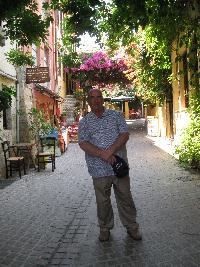| Pages sur ce sujet: [1 2] > | Poll: Do you prepare a yearly budget for your professional training? Auteur du fil: ProZ.com Staff
|
|---|
This forum topic is for the discussion of the poll question "Do you prepare a yearly budget for your professional training?".
This poll was originally submitted by Silvia Barra. View the poll results »
| | | | Rolf Kern 
Suisse
Local time: 10:36
anglais vers allemand
+ ...
In memoriam
What is "professional training" in our profession as translators?
[Bearbeitet am 2013-04-02 10:53 GMT]
| | | | Michael Harris 
Allemagne
Local time: 10:36
Membre (2006)
allemand vers anglais
I do not plan, but if something comes along that may be interesting and I have time, then the resources shall be unleashed:-)
| | | |
Michael Harris wrote:
I do not plan, but if something comes along that may be interesting and I have time, then the resources shall be unleashed:-)
| | |
|
|
|
Enrico Zoffoli 
Italie
Local time: 10:36
Membre (2013)
allemand vers italien
+ ...
In my view, one of the (many) good things about this job is that "formal" training isn't necessary. One becomes a better translator simply by translating.
| | | | Julian Holmes 
Japon
Local time: 17:36
Membre (2011)
japonais vers anglais
| No plans or preparations | Apr 2, 2013 |
Like Michael, Teresa and Enrico
Because, by the nature of our profession, we -- unfortunately -- don't know when the next work is coming in unless we have a promise of work in the form of a PO, which makes it difficult to plan ahead. 
I suppose we could "allocate" a certain amount of funds based on historical figures so that we could learn new software skills, go on training seminars in our particular field... See more Like Michael, Teresa and Enrico
Because, by the nature of our profession, we -- unfortunately -- don't know when the next work is coming in unless we have a promise of work in the form of a PO, which makes it difficult to plan ahead. 
I suppose we could "allocate" a certain amount of funds based on historical figures so that we could learn new software skills, go on training seminars in our particular fields, etc. etc.
However, I do think it is an intrinsic part of all of us to continue to move forward and develop as part of our CPD and hone our skills by our own efforts.  ▲ Collapse
| | | | R. Alex Jenkins 
Brésil
Local time: 05:36
Membre (2006)
portugais vers anglais
+ ...
I try to 'prepare' a yearly budget for the education of my kids.
| | | | Mario Chavez (X) 
Local time: 04:36
anglais vers espagnol
+ ...
| A personal opinion a fact does not make | Apr 2, 2013 |
Enrico Zoffoli wrote:
In my view, one of the (many) good things about this job is that "formal" training isn't necessary. One becomes a better translator simply by translating.
Perhaps for you, Enrico, formal training is not in the cards or a desirable pursuit. Your opinion does not invalidate the positive effects of a properly executed formal education for translators.
I speak both as a translator with years of experience and as an educator.
| | |
|
|
|
Mario Chavez (X) 
Local time: 04:36
anglais vers espagnol
+ ...
| The key word is budget | Apr 2, 2013 |
Whether we resort to professional, formal or informal, training to advance our expertise and learning, the point of the question is whether we prepare a yearly budget or not.
I, for one, do not. At best, I assume I'll spend about two thousand dollars a year in the annual ATA conference, including travel and lodging, with exclusion of the income I won't be getting in those days. But it's an investment.
That said, ATA conferences are just one of many opportunities availab... See more Whether we resort to professional, formal or informal, training to advance our expertise and learning, the point of the question is whether we prepare a yearly budget or not.
I, for one, do not. At best, I assume I'll spend about two thousand dollars a year in the annual ATA conference, including travel and lodging, with exclusion of the income I won't be getting in those days. But it's an investment.
That said, ATA conferences are just one of many opportunities available for the translator in search of professional development. And not all of those opportunities touch on translation or interpreting per se. ▲ Collapse
| | | |
I spend about $4,000 a year on university fees and books, though this year I spent a little more for software.
I am studying business management and law, which, for me, has been a great investment.
| | | | Enrico Zoffoli 
Italie
Local time: 10:36
Membre (2013)
allemand vers italien
+ ...
| Please read before (mis)quoting | Apr 2, 2013 |
Mario Chavez wrote: Enrico Zoffoli wrote:
In my view, one of the (many) good things about this job is that "formal" training isn't necessary. One becomes a better translator simply by translating. Perhaps for you, Enrico, formal training is not in the cards or a desirable pursuit. Your opinion does not invalidate the positive effects of a properly executed formal education for translators. I speak both as a translator with years of experience and as an educator.
I said formal education is not a necessary condition for being a good translator. My claim entails no denial of the view that formal training can be of some help. Necessary conditions and auxiliary conditions are two completely different things.
| | | | | In the cards.. | Apr 2, 2013 |
Mario Chavez wrote:
Perhaps for you, Enrico, formal training is not in the cards
Shouldn't that be "on the cards"?
Good luck with the formal training..
Steve K.
| | |
|
|
|
| | Claire Cox
Royaume-Uni
Local time: 09:36
français vers anglais
+ ...
| UK/US difference? | Apr 2, 2013 |
Triston Goodwin wrote: Steve Kerry wrote: Mario Chavez wrote:
Perhaps for you, Enrico, formal training is not in the cards
Shouldn't that be "on the cards"? Good luck with the formal training.. Steve K. Hi, it is "in the cards" http://idioms.thefreedictionary.com/in%20the%20cards
Born and bred in England, I'd certainly say "on the cards" - perhaps it's yet another of those niggling differences between British English and American English?!
As for training, if something comes up that appeals, be it this year's ITI conference in Gatwick or a training course in one of my chosen software packages that looks beneficial, or a networking event, then I'm happy to spare the funds/time if I can. I don't think you can predict in advance what will be available or whether you'll be able to fit it in with work/family commitments....
[Edited at 2013-04-02 19:46 GMT]
| | | | Mario Chavez (X) 
Local time: 04:36
anglais vers espagnol
+ ...
| Please re-read | Apr 2, 2013 |
Enrico Zoffoli wrote: Mario Chavez wrote: Enrico Zoffoli wrote:
In my view, one of the (many) good things about this job is that "formal" training isn't necessary. One becomes a better translator simply by translating. Perhaps for you, Enrico, formal training is not in the cards or a desirable pursuit. Your opinion does not invalidate the positive effects of a properly executed formal education for translators. I speak both as a translator with years of experience and as an educator. I said formal education is not a necessary condition for being a good translator. My claim entails no denial of the view that formal training can be of some help. Necessary conditions and auxiliary conditions are two completely different things.
Enrico, your initial statement was a sweeping generalization. I quote "formal training isn't necessary." What makes you say that? A reasonable reader would infer that a good translator does not need formal training. That's a fallacy. A sweeping generalization cast as opinion and recast as purported fact is flawed. That was my point. I did not misquote you.
| | | | | Pages sur ce sujet: [1 2] > | To report site rules violations or get help, contact a site moderator: You can also contact site staff by submitting a support request » Poll: Do you prepare a yearly budget for your professional training? | Anycount & Translation Office 3000 | Translation Office 3000
Translation Office 3000 is an advanced accounting tool for freelance translators and small agencies. TO3000 easily and seamlessly integrates with the business life of professional freelance translators.
More info » |
| | Protemos translation business management system | Create your account in minutes, and start working! 3-month trial for agencies, and free for freelancers!
The system lets you keep client/vendor database, with contacts and rates, manage projects and assign jobs to vendors, issue invoices, track payments, store and manage project files, generate business reports on turnover profit per client/manager etc.
More info » |
|
| | | | X Sign in to your ProZ.com account... | | | | | |














